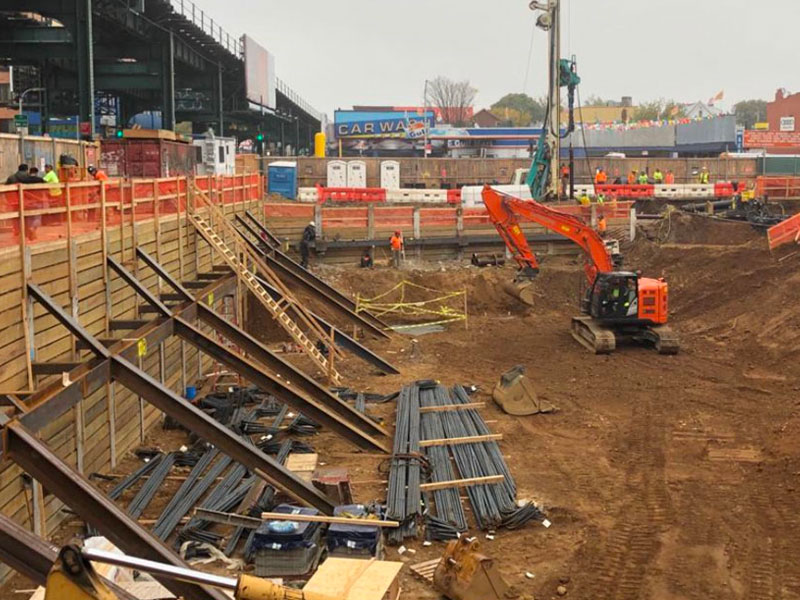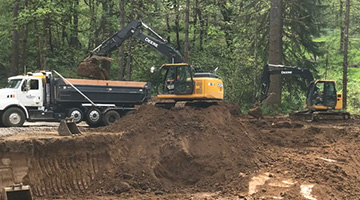Industrial Lancaster Trenching - Trenching Services for Businesses in Lancaster
Industrial Lancaster Trenching - Trenching Services for Businesses in Lancaster
Blog Article
Comprehensive Excavation Techniques: Grasping the Fundamentals for Success
In the world of building and civil engineering, the significance of efficient excavation methods can not be overstated. The cautious preparation, accurate implementation, and precise interest to information called for in excavation tasks require an extensive method that incorporates various basic elements. From preliminary dirt analysis to the execution of security procedures and regular development surveillance, mastering these core aspects is necessary for attaining success in any type of excavation venture. The real mastery lies not simply in recognizing these principles yet in effortlessly integrating them to browse the complexities of excavation jobs with finesse.
Recognizing Excavation Task Preparation

Successful excavation tasks are constructed on the foundation of precise and detailed planning. The initial stage of any type of excavation task is the preparation phase, where essential choices are made that can considerably influence the end result of the project. Throughout this phase, it is vital to collect all pertinent information concerning the website, including topographical surveys, soil composition, and any potential risks that may exist. Recognizing the task timeline, budget, and extent constraints is crucial for creating a detailed excavation strategy that ensures the job's success.
One key facet of excavation job planning is the advancement of a detailed timeline that details the sequence of activities, landmarks, and due dates. This timeline functions as a roadmap for the project team, allowing them to track progression and make necessary modifications to ensure the job remains on timetable. Additionally, a distinct spending plan that makes up all expenses, including devices service, labor costs, and materials, is necessary for preventing price overruns and delays. By carefully taking into consideration all these elements throughout the drawing board, excavation jobs can be implemented effectively and efficiently, causing successful end results.
Dirt Evaluation and Website Evaluation
Carrying out extensive dirt analysis and website analysis is an important action in the prep work stage of any excavation task. Dirt analysis involves determining the composition, framework, and properties of the soil at the excavation site. This details is crucial for recognizing the dirt's bearing capacity, wetness web content, and potential for erosion, which are vital consider identifying the excavation approaches and devices required for the job.
Website examination surpasses soil analysis and incorporates a wider analysis of the overall site conditions. This examination consists of identifying any possible dangers, such as below ground utilities, environmental concerns, or unstable terrain, that could affect the excavation procedure. By completely examining the website, task supervisors can create reliable excavation methods that focus on safety and security, efficiency, and ecological protection.
Making use of advanced technologies like ground-penetrating radar, soil tasting, and drone surveys can enhance the accuracy and performance of dirt evaluation and website examination. Investing time and resources in these initial actions can ultimately save time and avoid costly hold-ups or problems during the excavation procedure.
Tools Selection and Application
Effective excavation jobs depend heavily on tactical tools selection and usage to ensure optimum performance and productivity. Picking the ideal tools for the work is critical in taking full advantage of efficiency and decreasing downtime. Elements such as the sort of dirt, deepness of excavation, and task range play a substantial role in determining one of the most ideal tools for the task available.

In enhancement to choosing the proper tools, correct usage is crucial to job success. Operators has to be trained to manage the tools safely and successfully - dump truck companies in ohio. Normal maintenance checks and prompt fixings assist prevent malfunctions and guarantee constant efficiency throughout the task
Safety And Security Procedures and Laws Conformity
In the realm of excavation jobs, focusing on safety actions and compliance with guidelines is vital to guaranteeing a legitimately audio and secure functional atmosphere. Safety procedures incorporate a variety of methods, including performing thorough website assessments, carrying out correct signs and barriers, and supplying appropriate safety training for all workers involved in the excavation process. Adherence to laws, such as OSHA requirements in the United States, guarantees that the excavation job meets the essential criteria to protect employees, spectators, and the surrounding environment.

Surveillance Progress and Adjusting Methods
Just how can forecast supervisors efficiently track the advancement of excavation jobs and adjust their techniques appropriately to enhance end results? Surveillance progression is necessary for making sure that excavation jobs remain on track and meet target dates. Job managers can use numerous tools and methods to track progression, such as day-to-day report card, regular site evaluations, and browse around this web-site progressed monitoring innovations like drones and GPS tracking systems. By constantly keeping an eye on the task's improvement, supervisors can recognize any type of prospective delays or problems early on and take proactive actions to address them.

Verdict
Finally, understanding the principles of thorough excavation techniques is necessary for the success of any project. By recognizing task planning, examining dirt and site problems, selecting ideal equipment, adhering to safety policies, and keeping track of progress, job supervisors can make certain a efficient and smooth excavation process. Applying these methods will certainly lead to effective outcomes and lessen possible dangers or troubles during the excavation job.
The first phase of any excavation project is the preparation phase, where vital decisions are made that can significantly additional info influence the end result of the task. Recognizing the project timeline, budget, and extent restrictions is crucial for producing a detailed excavation plan that guarantees the task's success.
Exactly how can forecast supervisors successfully track the improvement of excavation tasks and adapt their methods accordingly to maximize end results? By very closely keeping an eye on progress and being prepared to adjust techniques, task supervisors can boost the overall success of excavation jobs.
By understanding project preparation, assessing dirt and site conditions, picking ideal equipment, complying with safety and security policies, and checking progress, task managers can guarantee a smooth and effective excavation process.
Report this page